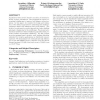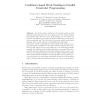73 search results - page 1 / 15 » Idempotent work stealing |
PPOPP
2009
ACM
14 years 10 months ago
2009
ACM
Load balancing is a technique which allows efficient parallelization of irregular workloads, and a key component of many applications and parallelizing runtimes. Work-stealing is ...
HPDC
2012
IEEE
11 years 11 months ago
2012
IEEE
Applications often involve iterative execution of identical or slowly evolving calculations. Such applications require incremental rebalancing to improve load balance across itera...
SPAA
2009
ACM
14 years 2 months ago
2009
ACM
Work stealing is a common technique used in the runtime schedulers of parallel languages such as Cilk and parallel libraries such as Intel Threading Building Blocks (TBB). Depth-r...
CP
2009
Springer
14 years 10 months ago
2009
Springer
The most popular architecture for parallel search is work stealing: threads that have run out of work (nodes to be searched) steal from threads that still have work. Work stealing ...
SIGMETRICS
2010
ACM
14 years 2 months ago
2010
ACM
In this paper, we consider a generic model of computational grids, seen as several clusters of homogeneous processors. In such systems, a key issue when designing efficient job al...


